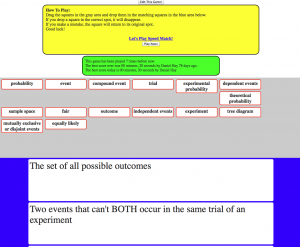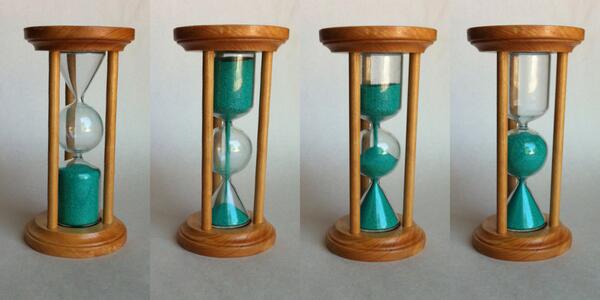"I got into math teaching because I loved math. I needed no incentive to love math. Line up a whole bunch of problems, I'll do em. Attach your approval as my teacher and I'll do even more. But then they gave me students who, low and behold, don't love math like I do."And to finish, in the end, he reveals the best tool that he has and that is math. Math is used to both create perplexity and to attack it. Nicely done.
Curriculum Tags: All
http://blog.mrmeyer.com/2014/my-opening-keynote-for-cue-2014/
Having just read Nate Silver's "The Signal and the Noise" reminds me how important the idea of confidence interval is. Here is a nice resource on things that are important when calculating confidence intervals.
Curriculum Tags: MDM4U
http://learnandteachstatistics.wordpress.com/2014/03/31/teaching-confidence-intervals/
 Hey, I really like this Speed Match game for low level vocabulary practice. I think kids would play it and learn a bit of vocabulary to boot. I say it's low level because, in general, memorizing formulas or definitions is just that, low on the cognitive scale. But having kids memorize facts is not necessarily a bad thing. You just can't make it the prime focus of your teaching curriculum. So this game is a great way that you can get that stuff done for kids. And it works on the iPad. You can create your own game and do so without creating an account too. And another one from Mathy Cathy is Kahoot which is an online MC game where speed is of the essence.
Hey, I really like this Speed Match game for low level vocabulary practice. I think kids would play it and learn a bit of vocabulary to boot. I say it's low level because, in general, memorizing formulas or definitions is just that, low on the cognitive scale. But having kids memorize facts is not necessarily a bad thing. You just can't make it the prime focus of your teaching curriculum. So this game is a great way that you can get that stuff done for kids. And it works on the iPad. You can create your own game and do so without creating an account too. And another one from Mathy Cathy is Kahoot which is an online MC game where speed is of the essence.http://www.mathycathy.com/blog/2014/04/superteachertools-net-speed-match/
http://www.mathycathy.com/blog/2014/04/kahoot-a-great-formative-freebie/
 Here's a really neat little applet made with Geometer's Sketchpad and put online. Perfect for introducing periodic functions. And it works on the iPad as well
Here's a really neat little applet made with Geometer's Sketchpad and put online. Perfect for introducing periodic functions. And it works on the iPad as wellCurriculum Tags: MCF3M, MCR3U
http://blog.keycurriculum.com/2014/04/understand-the-sine-function-by-dancing-it/
 Kyle at the Tap Into Teen Minds blog continues to catalogue all those 3 Act Math tasks being created around the web. He matches them up to curriculum (both common core and Ontario math) and usually adds his own worksheets and extras. This one is referencing one of Dan Meyer's from a couple of years ago and does a good job of dealing with rates of change. Click on the Access Math Task button to get Dan's original 3 Act task download and click on the Access Handouts button to get Kyle's handouts.
Kyle at the Tap Into Teen Minds blog continues to catalogue all those 3 Act Math tasks being created around the web. He matches them up to curriculum (both common core and Ontario math) and usually adds his own worksheets and extras. This one is referencing one of Dan Meyer's from a couple of years ago and does a good job of dealing with rates of change. Click on the Access Math Task button to get Dan's original 3 Act task download and click on the Access Handouts button to get Kyle's handouts.Curriculum Tags: Gr7, Gr8, MPM1D, MFM1P
http://tapintoteenminds.com/3act-math/bolt/
Do you want to give your kids a good straightforward traditional math review of Calculus. Then look no further than this online primer course given by MIT professor Gilbert Strang. It is intended for high school students so feel free to share.
Curriculum Tags: MCV4U
http://ocw.mit.edu/resources/res-18-005-highlights-of-calculus-spring-2010/
Here's a really nice little intro to the idea of the Normal Curve. Thanks to Jordynne Lowe for this one.
Curriculum Tags: MDM4U
http://www.shmoop.com/video/normal-distribution-curve
Ok so this is mainly aimed at university Calculus students but it's still funny.
Curriculum Tags: MCV4U
http://www.youtube.com/watch?v=enhxOTVNuNM
I love this image of an hour glass that demonstrates Archimedes proof that the volume of a cylinder is the same as the volume of a sphere plus the volume of a cone (with height equal to the diameter of the sphere for both the cone and the cylinder)
Curriculum Tags: MPM1D, MFM1P
What is a little math if you can't include a little literacy. Yay for cross curricular images.
Curriculum Tags: Gr7, Gr8, MFM1P, MPM1D








No comments:
Post a Comment